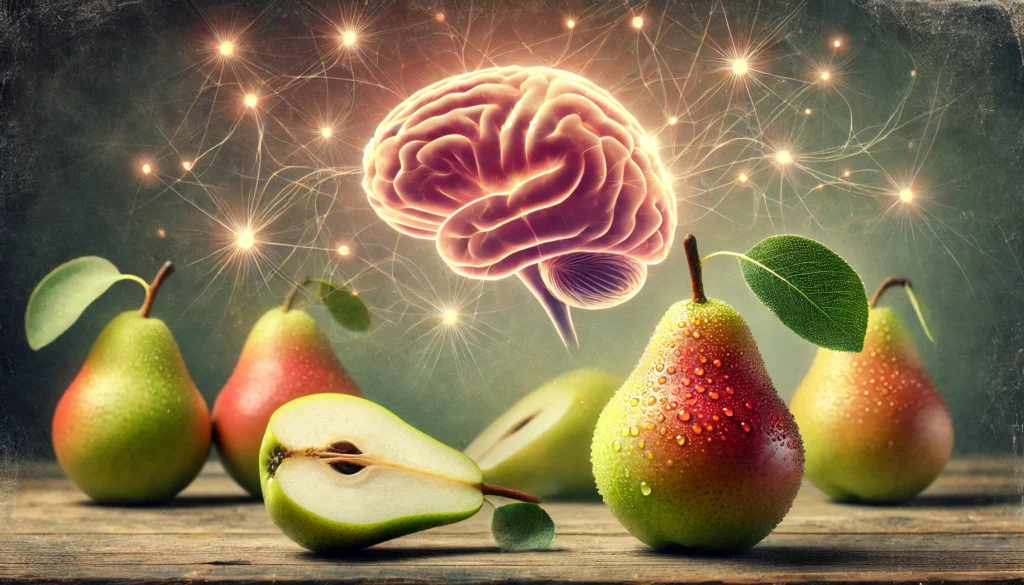Pears (Pyrus communis), often regarded as a simple and wholesome fruit, contain a wealth of bioactive compounds that contribute to various health benefits, including antioxidant, anti-inflammatory, and neuroprotective properties. While pears are not traditionally considered a nootropic in the same way as other supplements like ginkgo biloba or omega-3 fatty acids, the nutrients and phytochemicals they contain—such as dietary fiber, flavonoids, and vitamins—offer promising cognitive benefits.
In this article, we explore the potential of pears as a nootropic supplement, examining their sources, chemical composition, physiological effects on the brain and body, possible cognitive benefits, recommended dosage, side effects, interactions with other supplements or medications, and safety considerations.
You May Also Like:
Sweet Orange: Benefits, Dosage, Side Effects, Drug Interactions, and Other Important Information
APPLE: Benefits, Dosage, Side Effects, Drug Interactions, And Other Important Information
Sources of Pear
Pears are native to regions across Europe and Asia and have been cultivated for thousands of years. There are over 3,000 varieties of pears, with Pyrus communis being the most common in Europe and the United States. The fruit is widely available and comes in several varieties, including Bartlett, Anjou, Bosc, and Comice. Each offers slight differences in flavor and texture but similar nutritional benefits.
- Dietary form: Pears are typically consumed fresh, dried, or as part of juices, smoothies, and desserts. Pear extracts are also available as supplements for those who want to concentrate on the fruit’s bioactive components.
- Health benefits beyond nootropics: Pears are lauded for their digestive benefits due to their high fiber content, their role in heart health by helping regulate cholesterol and their contribution to immune health through their antioxidant content.
The nutrients found in pears, particularly vitamins, and flavonoids, provide the foundation for their potential cognitive benefits.
Boost Your Health Naturally with Pears—Great for Both Body and Brain!

Chemistry of Pear
The bioactive compounds in pears are responsible for their health-promoting effects. Some key compounds include:
- Flavonoids: Pears are rich in flavonoids such as quercetin, catechins, and epicatechins. These compounds exhibit strong antioxidant and anti-inflammatory properties, protecting neurons from oxidative stress and inflammation.
- Dietary Fiber (Pectin): Pears contain high levels of soluble fiber, particularly pectin, which can support gut health. Emerging research suggests that gut health plays a crucial role in brain function, particularly through the gut-brain axis, where gut bacteria can influence cognitive processes such as memory and mood.
- Vitamin C: A potent antioxidant, vitamin C neutralizes free radicals and reduces oxidative stress in the brain, which can otherwise damage neurons and contribute to cognitive decline.
- Vitamin K: Present in moderate amounts, vitamin K is essential for brain health as it helps regulate calcium deposits in the brain and plays a role in the synthesis of sphingolipids, which are crucial components of neuronal membranes.
- Phenolic Acids: Pears contain phenolic compounds like chlorogenic acid, which have been shown to exhibit neuroprotective effects by reducing oxidative damage and inflammation in brain cells.
These bioactive compounds support the brain’s ability to fend off oxidative stress and inflammation, two key contributors to cognitive decline and neurodegenerative diseases.

Physiological Mechanisms of Pear in the Body and Brain
Pears provide a range of cognitive and neurological benefits due to their rich composition of antioxidants, flavonoids, and fiber. These compounds interact with various physiological mechanisms that can enhance cognitive health.
- Antioxidant Effects: The brain is highly susceptible to oxidative damage due to its high oxygen consumption and lipid content. Oxidative stress plays a major role in the aging process and the development of neurodegenerative diseases such as Alzheimer’s disease. The antioxidants found in pears, including vitamin C, quercetin, and phenolic acids, help neutralize free radicals, reducing oxidative stress and protecting brain cells from damage.
- Anti-inflammatory Properties: Chronic inflammation in the brain, known as neuroinflammation, is associated with cognitive impairments and the progression of diseases like Alzheimer’s and Parkinson’s. Pears’ flavonoids, particularly quercetin, have anti-inflammatory effects that can reduce the production of pro-inflammatory cytokines, thereby limiting damage to neurons and preserving cognitive function.
- Gut-Brain Axis: The dietary fiber in pears, especially pectin, plays a crucial role in maintaining a healthy gut microbiome. A healthy gut microbiome is essential for optimal brain function, as the gut-brain axis allows gut bacteria to influence neurotransmitter production, including serotonin and dopamine, which are key for mood regulation and cognitive processes such as memory and attention. Soluble fiber can also help stabilize blood sugar levels, preventing spikes and crashes that can affect cognitive performance.
- Neuroprotection: Quercetin, one of the most prominent flavonoids in pears, is known for its neuroprotective properties. It helps prevent the death of neurons by protecting them from oxidative damage and inflammation. Quercetin has also been shown to promote the expression of brain-derived neurotrophic factor (BDNF), a protein that supports the growth and maintenance of neurons, which is crucial for learning and memory.
- Cardiovascular Support: Cardiovascular health is closely linked to cognitive function. Poor circulation or high blood pressure can reduce blood flow to the brain, impairing cognitive performance. Pears help maintain heart health by lowering cholesterol and regulating blood pressure, thanks to their fiber and potassium content. Better cardiovascular health ensures adequate blood flow to the brain, supporting cognition.
Nourish Your Body and Brain with the Essential Benefits of Pears—Buy Now!

Nootropic Benefits of Pear
While pears are not conventionally categorized as nootropic supplements, the nutrients and phytochemicals they contain suggest several cognitive benefits that warrant consideration. These include:
- Memory Enhancement: The antioxidants in pears, particularly quercetin, protect neurons from oxidative damage, which is critical for preserving memory. Quercetin also enhances BDNF expression, supporting the formation of new neural connections essential for learning and memory.
- Improved Cognitive Function: Pears’ combination of vitamins, fiber, and flavonoids helps reduce oxidative stress and inflammation, leading to improved cognitive clarity and focus. By reducing inflammation in the brain and enhancing neuronal function, pears may improve overall cognitive performance.
- Mood Regulation: The fiber in pears helps stabilize blood sugar levels, which is important for preventing mood swings and promoting stable energy levels. Additionally, the gut-brain axis may play a role in mood regulation, as a healthy gut microbiome can influence the production of serotonin, a neurotransmitter that plays a key role in mood and emotional well-being.
- Neuroprotection: The neuroprotective effects of the antioxidants and flavonoids found in pears can protect the brain from cognitive decline and neurodegenerative diseases. Regular consumption of pears may delay the onset of conditions like Alzheimer’s disease by reducing inflammation and oxidative stress in the brain.
- Cognitive Longevity: Pears’ combination of antioxidants, vitamins, and fiber supports long-term cognitive health. By protecting neurons from damage and promoting healthy circulation, pears may help maintain cognitive function as individuals age.

Dosage and Supplementation Guidelines
Pears are primarily consumed as part of a balanced diet, but for those seeking nootropic benefits, specific consumption guidelines can be followed to optimize cognitive health.
- Dietary Intake: Consuming 1-2 medium-sized pears daily provides a significant amount of dietary fiber, antioxidants, and flavonoids that support brain health. Pears can be eaten fresh, dried, or in juices and smoothies.
- Supplemental Use: Pear extracts are available in capsule or liquid form, offering a concentrated source of the fruit’s bioactive compounds. Typical doses range from 500-1,000 mg daily, depending on the formulation and the intended benefits.
- Juice: Drinking pear juice can be a convenient way to consume the fruit’s nutrients, though it is important to opt for unsweetened, fresh-pressed varieties to avoid excess sugars that could negate the health benefits.
Unlock Whole-Body Health with the Nutritional Power of Pears—Shop for Yours Now!

Side Effects and Safety
Pears are generally safe for most people when consumed in normal dietary amounts. However, there are a few potential side effects and considerations for certain populations.
- Digestive Issues: Pears are high in fiber, which can cause digestive discomfort such as bloating or gas in individuals who are not accustomed to a high-fiber diet. To avoid this, it is advisable to gradually increase pear consumption and drink plenty of water to aid in digestion.
- Allergic Reactions: While rare, some individuals may experience allergic reactions to pears, particularly those with birch pollen allergies, due to cross-reactivity. Symptoms may include itching, swelling, or difficulty breathing. Individuals with known fruit allergies should consult a healthcare provider before consuming pears.
- High Sugar Content: Pears are a source of natural sugars, and individuals with diabetes or those following a low-sugar diet should monitor their intake, especially when consuming pear juice or dried pears, which may have a higher concentration of sugars.
Interactions with Other Supplements and Medications
Pears are unlikely to interact with most medications or supplements, but there are a few considerations to keep in mind.
- Blood Sugar Medications: The natural sugars in pears may affect blood sugar levels, so individuals taking medications for diabetes should monitor their blood sugar levels when consuming pears. However, the fiber content in pears can help regulate blood sugar, making it a generally safe option for most people with diabetes when consumed in moderation.
- Fiber Supplements: If taking fiber supplements, it is important to adjust pear consumption accordingly to avoid excessive fiber intake, which could lead to digestive discomfort such as bloating or constipation.
- Nootropics: Pears can be safely combined with other nootropic supplements like omega-3 fatty acids or Ginkgo biloba to enhance cognitive function. However, it is important to maintain a balanced approach to supplementation, ensuring that pear intake complements rather than replaces other brain-boosting nutrients.
Risks for Individuals with Certain Health Conditions
While pears are safe for most individuals, certain health conditions may require caution when consuming this fruit.
- Diabetes: Pears contain natural sugars that may affect blood glucose levels. Although pears have a low glycemic index and contain fiber that helps moderate blood sugar spikes, individuals with diabetes should consume them in moderation and monitor their blood sugar levels.
- Kidney Disorders: Pears contain moderate amounts of potassium, which is typically beneficial for heart and muscle health. However, individuals with kidney disease may need to limit their potassium intake and should consult their healthcare provider before increasing their consumption of pears.
- Food Allergies: Individuals with fruit allergies, particularly birch pollen allergies, should be cautious about consuming pears due to the potential for cross-reactivity.
Embrace the Benefits of Pears for Physical and Mental Health—Order Now for Wellness!

Conclusion: Should You Consider Pear as a Nootropic?
Pears offer a variety of cognitive benefits due to their rich composition of antioxidants, flavonoids, and fiber. While they may not be a traditional nootropic supplement, the bioactive compounds in pears can support brain health, enhance memory, improve cognitive function, and protect against cognitive decline. Regular consumption of pears, whether through dietary intake or supplementation, can contribute to long-term cognitive health and overall well-being.
In summary, pears are a nutritious and accessible fruit that can be incorporated into a cognitive health regimen. Whether consumed as part of a balanced diet or through concentrated extracts, pears provide valuable nutrients that support brain function, making them a natural and effective option for promoting mental clarity and cognitive resilience.

References:
- 9 Health and Nutrition Benefits of Pears. Retrieved from: https://www.healthline.com/nutrition/benefits-of-pears
- 5 Health Benefits of Pears. Retrieved from: https://health.clevelandclinic.org/benefits-of-pears
- Systematic Review of Pears and Health. Retrieved from: https://pmc.ncbi.nlm.nih.gov/articles/PMC4657810/
- Pear Nutrition: Surprising Immune & Antioxidant Benefits. Retrieved from: https://draxe.com/nutrition/pear-nutrition/
- Are pears good for you? Types, nutrition, calories, benefits, and more. Retrieved from: https://www.medicalnewstoday.com/articles/285430
Important Note: The information contained in this article is for general informational purposes only, and should not be construed as health or medical advice, nor is it intended to diagnose, prevent, treat, or cure any disease or health condition. Before embarking on any diet, fitness regimen, or program of nutritional supplementation, it is advisable to consult your healthcare professional in order to determine its safety and probable efficacy in terms of your individual state of health.
Regarding Nutritional Supplements Or Other Non-Prescription Health Products: If any nutritional supplements or other non-prescription health products are mentioned in the foregoing article, any claims or statements made about them have not been evaluated by the U.S. Food and Drug Administration, and such nutritional supplements or other health products are not intended to diagnose, treat, cure, or prevent any disease.


